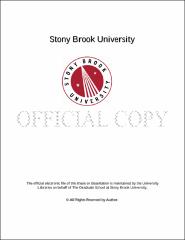| dc.identifier.uri | http://hdl.handle.net/11401/76610 | |
| dc.description.sponsorship | This work is sponsored by the Stony Brook University Graduate School in compliance with the requirements for completion of degree. | en_US |
| dc.format | Monograph | |
| dc.format.medium | Electronic Resource | en_US |
| dc.language.iso | en_US | |
| dc.publisher | The Graduate School, Stony Brook University: Stony Brook, NY. | |
| dc.type | Dissertation | |
| dcterms.abstract | We live in a culture divided between dogmatism and relativism. This division arises, in large part, from competing rationalities--a plurality of beliefs about what is true or good. This dichotomy is particularly manifest as regards the diversity of religious truth claims. By outlining a mechanism of inter-cultural justification of beliefs the dissertation addresses how it is possible to adjudicate diverse rationalities without appealing to Enlightenment notions of evidence or Reformed epistemologies. The Enlightenment demanded that religious beliefs be justified by evidence acceptable to all; the Reformed epistemologists argued that religious beliefs are justified by " properly basic beliefs" produced by the proper functioning of God given faculties. These two popular philosophical approaches, the dissertation argues, are inadequate to the bridging the contemporary culture divide. Moreover, the dissertation argues that the rejection of Enlightenment principles of rationality in favor of a hermeneutic model will not lead to skepticism or relativism. Utilizing the resources of the hermeneutic school, it is argued that understanding justification as eminently context dependent, yet intelligible (in principle) to any potential interlocutor, allows for a robust understanding of rationality without falling into either dogmatism or relativism. | |
| dcterms.available | 2017-09-20T16:50:48Z | |
| dcterms.contributor | Welton, Donn | en_US |
| dcterms.contributor | Mar, Gary | en_US |
| dcterms.contributor | Casey, Edward | en_US |
| dcterms.contributor | Simpson, Lorenzo | en_US |
| dcterms.contributor | Flescher, Andrew. | en_US |
| dcterms.creator | Casey, Patrick James | |
| dcterms.dateAccepted | 2017-09-20T16:50:48Z | |
| dcterms.dateSubmitted | 2017-09-20T16:50:48Z | |
| dcterms.description | Department of Philosophy. | en_US |
| dcterms.extent | 242 pg. | en_US |
| dcterms.format | Application/PDF | en_US |
| dcterms.format | Monograph | |
| dcterms.identifier | http://hdl.handle.net/11401/76610 | |
| dcterms.issued | 2015-08-01 | |
| dcterms.language | en_US | |
| dcterms.provenance | Made available in DSpace on 2017-09-20T16:50:48Z (GMT). No. of bitstreams: 1
Casey_grad.sunysb_0771E_11594.pdf: 1216385 bytes, checksum: 63c8c6efd044c835c2ab551ac534201b (MD5)
Previous issue date: 2013 | en |
| dcterms.publisher | The Graduate School, Stony Brook University: Stony Brook, NY. | |
| dcterms.subject | Philosophy | |
| dcterms.title | Reconstructing Rationality: A Hermeneutic Alternative to Evidentialism and Reformed Epistemology Using Themes from Wittgenstein, Davidson, and Ricoeur | |
| dcterms.type | Dissertation | |

